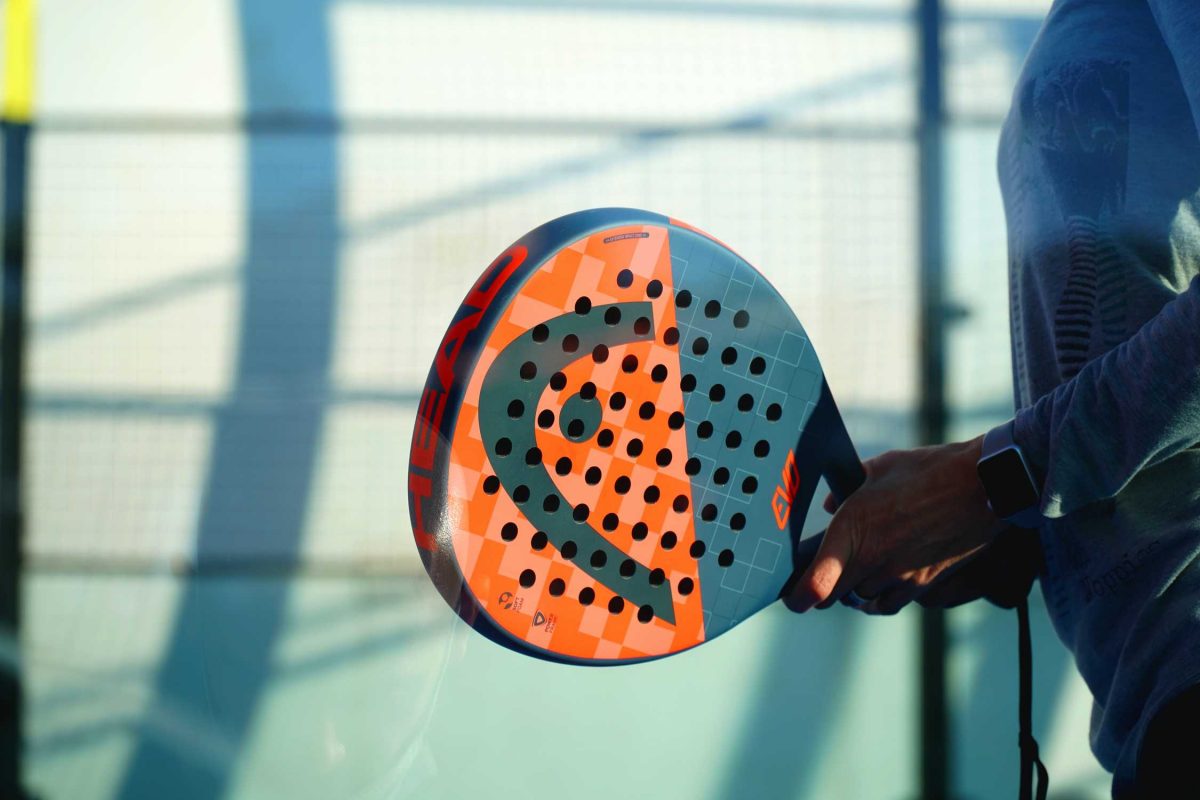A few years ago, if you’d said that one of your hobbies was padel, people would have thought you were referring to stand up paddleboarding. Mention padel now, however, and it’s highly likely you’ll get a beaming smile of recognition followed by an enthusiastic description of a rally they saw in a professional match on YouTube that morning (Google ‘insane padel rallies’ and you’ll see what I mean).
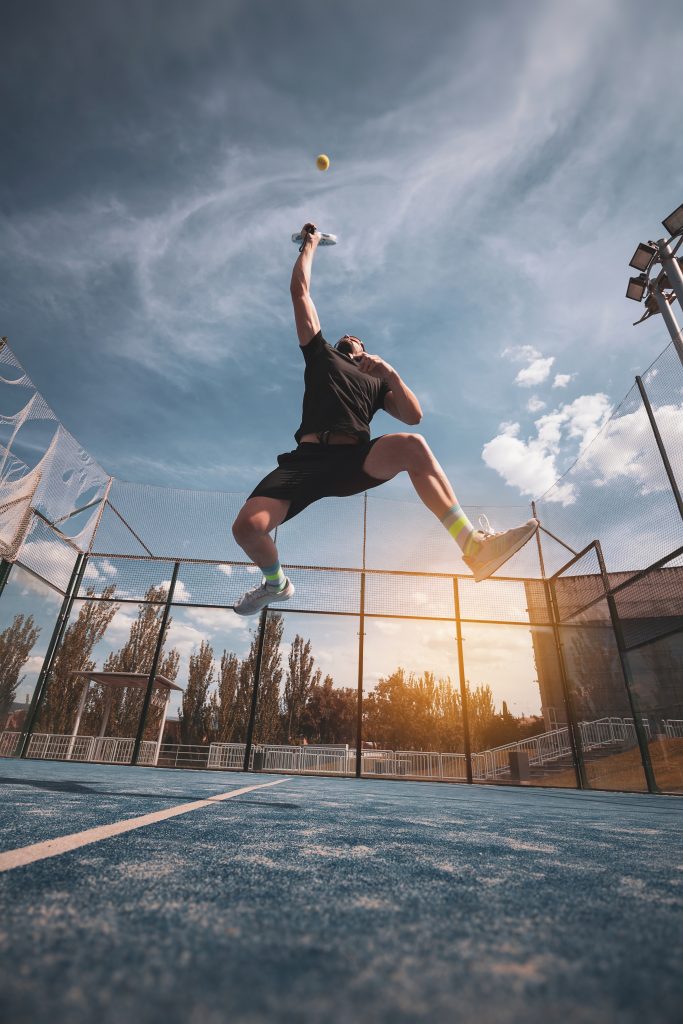
Padel is the hottest thing to happen to racquet sports since Rafa Nadal’s mahogany biceps. A high-energy hybrid of squash and tennis, padel is played on a court surrounded by reinforced glass walls and is all about deftness of touch, chasing rebounds, playing the angles, and guiding the ball into corners to make it awkward for your opponent to return the ball. If tennis is the equivalent of a five-day cricket Test match, padel is the Twenty20 Big Bash League.
Kite Beach, Al Quoz, Emirates Golf Club, JLT, Ripe Market, Jumeirah Golf Estates… padel courts have been popping up all over Dubai in the last three years. Yet the sport’s astonishing popularity in Dubai means that, despite the growing number of clubs, it’s easier to book a table at Zuma on Saturday night than it is to find an available padel court. Drive past any padel club – even late at night – and you’ll see a flurry of activity as players get their fix of this addictive game.
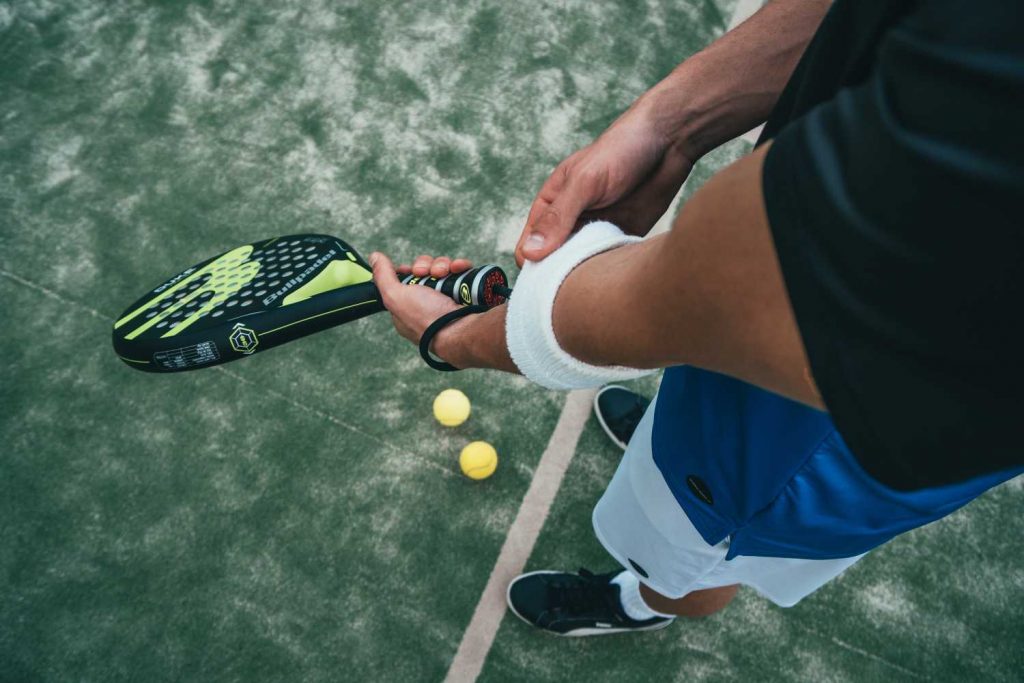
I took up padel because I was becoming increasingly frustrated by playing – and failing at – tennis. What looks easy on TV when Rafa and Roger exchange ground strokes is maddeningly difficult in real life as a court with large dimensions, tramlines and baselines results in minuscule room for error. Padel, however, is easy to learn and you can improve quickly because the absence of lines (apart from when serving) means a mishit backhand goes unpunished thus allowing players more freedom to experiment with their shots.
A game played in doubles and scored the same way as tennis, padel rallies are dizzyingly enjoyable as the ball gets pinged around a carpeted court that is about 25 per cent smaller than a singles tennis court. Games are often mixed gender and the proximity of players makes padel a more social and intimate game than tennis. The speed of play, meanwhile, results in a session that gets the heart rate soaring.
Unlike the complicated – almost balletic – serve in tennis, serving in padel is done underarm at waist height with the ball bouncing on the floor first, which helps to accelerate game play by increasing the first serve percentage. Padel balls are slower and softer than tennis balls and therefore easier to retrieve. Perforated padel bats have short handles and are made from foam and carbon fibre which enables players to exert greater control on the ball – plus they make a hugely satisfying ‘thock’ when you really connect.
Jon Price has been a keen padel player since 2016 and has seen the sport grow at a rapid rate in Dubai.
“There were very few courts available when I started playing and as a result it was an expensive hobby,” says the British physiotherapist. “Luckily, as padel’s popularity has exploded in the last few years, so has the number of courts.”
For Price, padel is an accessible pastime that offers the opportunity to catch up with mates.
“It’s fast, fun and dynamic and I think that makes it a great social sport. You need a bit of skill and finesse, but it’s a pretty easy game to pick up and get playing without much expert guidance.”
***
HOLDING COURT
While most padel courts in Dubai rely on a simple formula of erecting a court and waiting for the bookings to rain down, Matcha Club is taking the sport to a more sophisticated level – and smashing it. Standing behind an elegant whitewashed wall in Al Quoz, the boutique padel club that opened in October 2021 leads visitors along a pathway lined with manicured shrubbery.
A shady courtyard houses two wellness studios for pilates, yoga and meditation, while Nette is an artisanal coffee shop and bistro offering a French-Japanese fusion menu – a concept far removed from the protein bar vending machine typically found at other padel clubs. Perhaps the most striking design feature of this bohemian hangout made from recycled wood and fitted with solar-heated showers, however, are the six courts. A beautiful shade of terracotta, they have appeared as photo shoot locations in the pages of luxury fashion magazines.
The club is owned by three Frenchmen and an Emirati who dreamed up the concept after becoming frustrated at being unable to find a slot at jam packed padel courts in Dubai.
Audrey Descols is the manager of Matcha and tells Esquire, “The design of other padel clubs is all the same so we wanted to create a different looking venue where people can play padel but also hang out, have lunch, and meet friends. The greenery makes people feel good in the middle of Al Quoz which, let’s be honest, is not the most beautiful part of Dubai.” The eye-catching colour of the playing surface, she smiles, is a tribute to the famous clay courts of Roland Garros where tennis’ French Open is held.
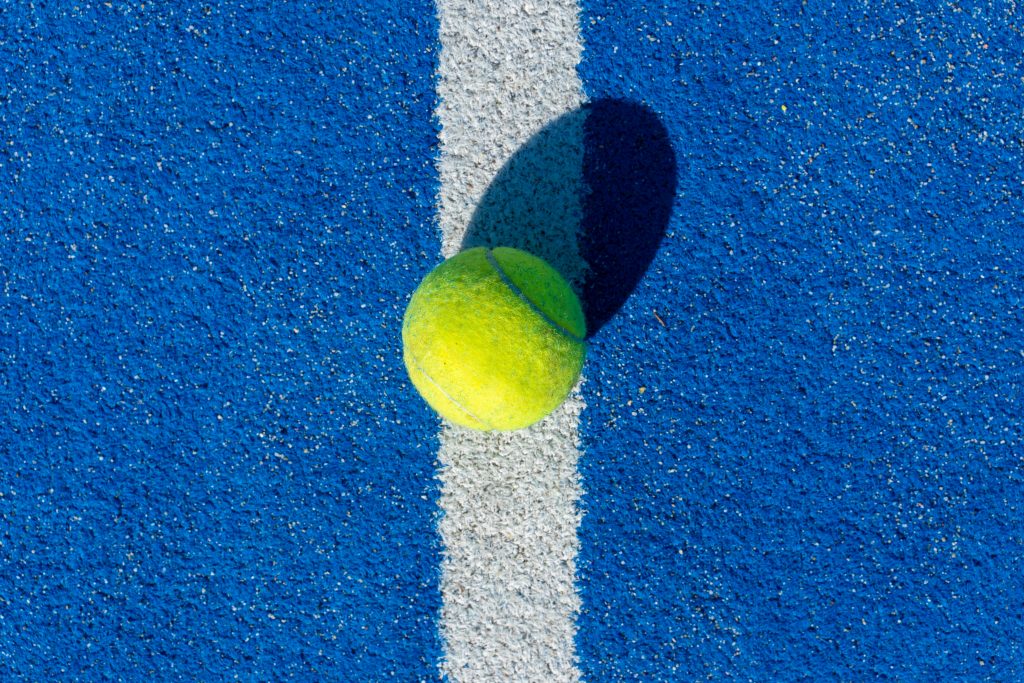
Booked solid since opening, Descols is coy when asked if Matcha’s owners plan on opening a second venue. She believes the appeal of padel is its accessibility.
“You don’t need to be super sporty or be a high level physical athlete to play,” she explains.
“Your level of play improves quite fast, and I think it’s a friendlier game than tennis. Plus, the cost of hiring a court is split between four people so it’s quite affordable.” She doesn’t see Dubai’s obsession with padel showing any sign of softening. “The UAE wants to make paddle its national sport so I think the boom will continue,” she says.
In agreement is Georges Najm, who’s head of sales at Just Padel, an organisation that aims to boost awareness of the game from its HQ in Mina Rashid. He estimates there are 10,000 padel players in the UAE. “The sport has grown in a magical way,” he says.
“More and more courts are opening every day in Dubai.”
He’s not wrong. In 2019, there were about 70 courts in the city – today there are more than 350. A significant moment came in 2021 when the inaugural Dubai Padel Cup at Jumeirah Emirates Towers ran across a month as part of Dubai Fitness Challenge and proved to be a huge success.
Rose Pérez has been coaching padel since 2008. The Spaniard runs sessions at Matcha and believes the UAE could achieve its ambition to make padel its national sport. “The UAE has all the resources, and something that I like about this country is its willingness,” she says.
“I’ve seen many skillful players here in Dubai, which raises the level and makes it competitive. Dubai gives you the chance to be outdoors eight months of the year and four months indoors, so you can practice all year round. Padel is a very social sport, kids, women and men, all ages are welcome. One thing that has impressed me in Dubai is the number of ladies I see playing every day, I love it.”
***
FIRST SERVE
“An exciting combination of lawn tennis and squash,” is how Lito Dela Cruz, a padel coach at Rackets Academy in Dubai, describes the sport. “It’s quite easy to play, especially if you’re a tennis player already.” He explains how His Highness Sheikh Hamdan Bin Mohammed Bin Rashid Al Maktoum, Crown Prince of Dubai and Chairman of Dubai Sports Council, gave padel a major push in 2013.
“The Sheikh started padel tournaments during Ramadan. Padel wasn’t popular before then but more people started to play it.” A year later, in 2014, the United Arab Emirates Padel Association was launched to bolster the sport’s footprint in the country. “Every year I’m getting busier with more bookings for lessons,” says Dela Cruz.
Dubai is a newcomer to the padel craze, which was born more than 50 years ago in Mexico when businessman Enrique Corcuera reportedly built the first padel court at his home in Acapulco in 1969 because he didn’t have enough room to build a full size tennis court.
Soon after, Argentina got bitten by the padel bug and is probably what led Lionel Messi to become a fan. The footballer has a padel court at his house in Barcelona and used to play with Luis Suarez when they were teammates for the Catalan club. Liverpool coach Jurgen Klopp and Zlatan Ibrahimovich are also advocates of the sport.
Padel is played in almost 60 countries around the world, but it is Spain where it has truly made its mark, with more than 20,000 courts satisfying the appetite of the population who have propelled padel to the second most popularly played sport behind football. It’s thought that in the next few years padel’s increasing participation numbers will enable the sport to become eligible for the Olympic Games.
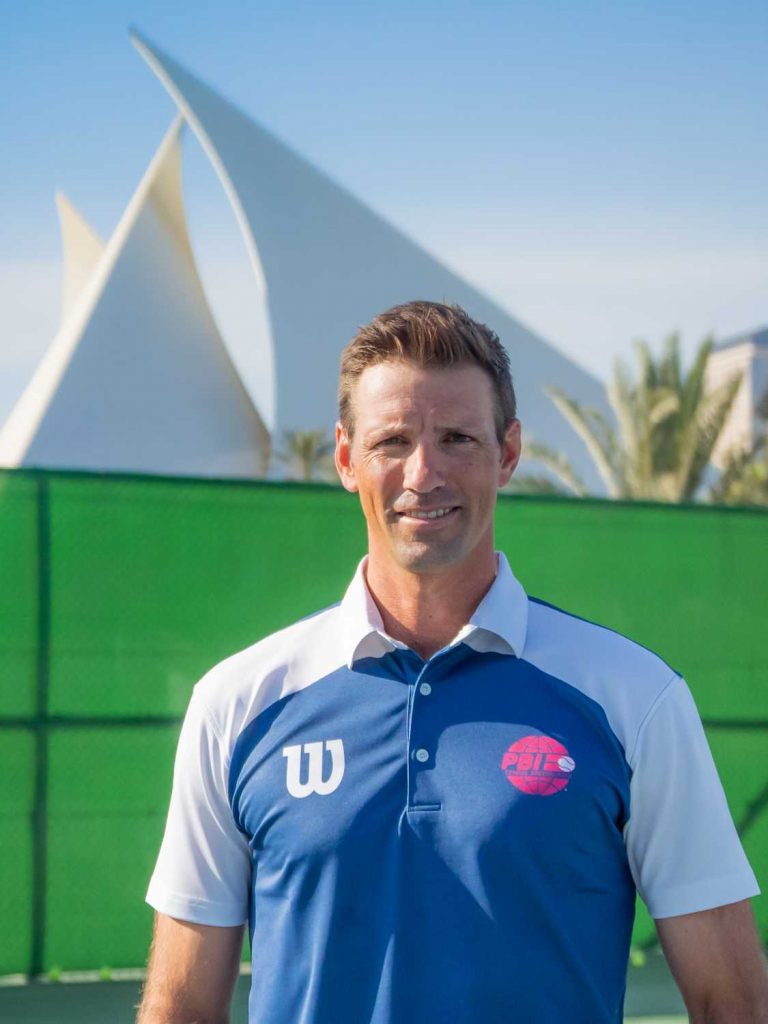
Should tennis be worried? No, says Jake Gard’ner, regional tennis director of Peter Burwash International (PBI) Tennis in Dubai and a professional coach. “I’ve definitely noticed more and more people in Dubai getting into padel,” says the New Zealander.
“It’s quite easy for tennis players to transition to padel. Overall, I’d say tennis players are adding padel to their hobbies, but they’re not necessarily dropping tennis completely.”
He enjoys the odd padel match himself and understands the appeal. “I like the social aspect of padel and the fact that it’s doubles, which is fun. I like how attainable padel is, you can play with people of varying skill levels yet still have a good game.
The fundamentals of padel are similar to tennis, but padel is an easier game to play. There are fewer grip changes in padel, there is no overarm serve and of course the court is smaller so the movement and fitness aspects of the game are easier.”
Pérez must go as she has another lesson due to start. But before she slips the safety strap of her racket around her wrist and enters the stylish terracotta coloured court, she says, “Since Matcha opened this past October I have been fully booked with clients, plus I have a waiting list each week also, so my workload has grown and I’m very grateful to work at this amazing venue. I feel so fortunate that I came to Dubai at the right moment to enjoy this opportunity with padel tennis.”
